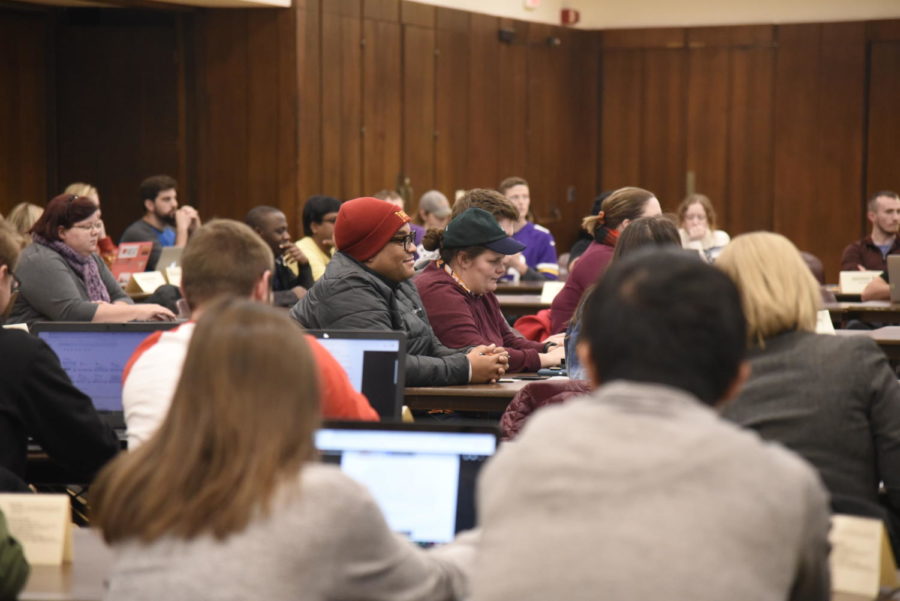Graduate and Professional Student Senate discusses ongoing diversity and inclusion efforts
June 30, 2020
Graduate and professional students discussed the topic of racism and how to challenge it Monday night.
The Graduate and Professional Student Senate (GPSS) invited Vice President of Diversity and Inclusion Reginald Stewart to discuss the ongoing diversity and inclusion efforts that impact the Iowa State community.
Stewart began the discussion by speaking on the current protests, why people are protesting and the intent behind them. He also made the comparison between the civil rights movement and the current Black Lives Matter movement.
“If you look at the civil rights movement, it was all about boycotting and not providing an economic infusion into areas that resulted in change economically,” Stewart said. “This is what we see happening. People are pushing retailers and things like that. So you need to be a part of the solution.”
The meeting took place virtually at 6:30 p.m. Monday.
“There’s a phrase millennials used and they say ‘OK boomer,’ and it’s a way to sort of dismiss the baby boomer generation,” Stewart said. “I think it’s the millennial generation that’s gotten a really bad rap in a number of circumstances that are flat out saying ‘we’re not taking this anymore.’ Right? And it’s a direct link back to the baby boomers, which is the impetus behind the civil rights movement. When people say ‘enough is enough, you’re going to now pass legislation and policy and you’re going to do things different than the rhetoric we normally experience.’ And so I think it is a generational movement that is forcing change and it’s forcing change economically.”
Recently, Iowa State has faced several protests against racism.
Hornaday also featured Ota Benga, a Congolese pygmy and a Black man, in the Monkey House of the Bronx Zoo. During the weekend in September of 1906, Benga lived in the Monkey House with an orangutan as an exhibit that was set up by Hornaday.
As a consequence, Wintersteen created a committee for a formal renaming policy and process for current plaques and historic monuments on campus.
“I’m picking up a lot of frustration from my classmates in that they understand big systemic change don’t happen [overnight] but they feel that the administration both at the college and the university level has been kind of slow at taking note of some pretty long-standing issues,” said Sen. Chelsea Iennarella-Servantez, representing the College of Veterinary Medicine. “Be it, you know, either buildings or certain attributions on campus named after figures that had controversial racial pasts — things like that.”
There have also been protests with the demand to change the name of Catt Hall, which was named to honor Carrie Chapman Catt and her work for women’s suffrage and a founder of the League of Women Voters.
She had also made the statement that “white supremacy will be strengthened, not weakened, by women’s suffrage.”
“Change on college campuses has always been driven by student need and student demand,” Stewart said. “The genesis behind true social change has always been pushed up by students. I wish I had a really well-developed answer to dismantle that, I just know that was my college experience and I know in general what seems to happen is students get to a tipping point with something and they push and push and push until change takes place.”
The GPSS also posed the question of providing the resources to start the conversation about the Black Lives Matter movement, racism and its impact on students and the campus. Stewart said the graduates should try to analyze the reason why people don’t want to have the conversation of racism.
As the conversation on racism continues over time, Stewart said the younger generation knows more about the imbalance than the previous generations.
“Yours is the generation that’s going to require you to have equity and inclusion competencies as part of your leadership portfolio and I think that’s exactly what we’ve been trying to unpack, you’re on the precipice of a new type of leadership or leadership expectations,” Stewart said. “It’s disconcerting for people who are currently in the workforce — people don’t fear change, they fear loss and they [fear] for a loss of control and they [fear] for a loss of autonomy. That’s where I think we’re struggling.”

















